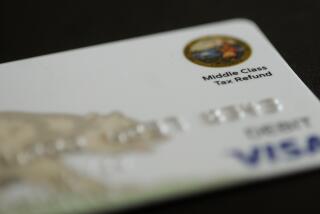You may be owed a check from the IRS
The Internal Revenue Service is going after about 5 million retirees and disabled people.
But don’t worry -- the tax agency is only trying to help. Really.
The people in the targeted group may be entitled to economic stimulus payments of $300 or more but haven’t yet claimed them, said IRS Commissioner Doug Shulman.
If they want a check this year, they have to file a simplified tax form by Oct. 15. The IRS is mailing information packets encouraging these individuals to file.
“All it takes is a few simple steps and the payment can be on its way,” Shulman said.
The problem is that the people in this group normally don’t have to file a tax return because they make too little money or most of their income is not taxable. But if you received at least $3,000 in certain types of income, including Social Security benefits last year, you’re entitled to a stimulus payment this year.
What should I do if I get one of these packets in the mail from the IRS?
Unless you’ve filed a return in the last few weeks, receiving the packet means you haven’t filed one but should do so because you’re probably entitled to a stimulus payment, said Eric Smith, an IRS spokesman.
Do I need to fill out a long tax form? Should I hire an accountant?
No to both questions. You can fill out Form 1040A. It’s only two pages, and if you’re filing solely to get the stimulus payment, you can fill in just a few lines. The IRS needs your name, address, Social Security number, filing status (e.g., married or single), the number of personal exemptions and the source and amount of your “qualifying income.”
What’s qualifying income?
That’s the income that qualifies you for a stimulus payment if it adds up to at least $3,000. It can include:
* Earned income
* Social Security retirement and disability benefits
* Veterans disability, pension or survivor benefits
* “Tier 1” railroad retirement benefits
* Nontaxable combat pay
Does Supplemental Security Income count?
No.
What if I don’t know the exact amount of my qualifying income? (Because I never file a tax return, I didn’t see any reason to keep my statement.)
You can estimate the amount by multiplying your current monthly benefit by the number of months you received benefits in 2007. For example, if you get $500 a month and received checks all year, you’d multiply $500 by 12 and report $6,000 of income.
Where on Form 1040 do I put how much income I received?
Wages go on line 7.
Social Security benefits, veterans benefits and railroad retirement benefits should go on line 14a.
Combat pay goes on line 40b.
Do I have to put anything else on the tax form, such as my charitable deductions or my municipal bond income?
If you didn’t earn enough to have to file a full return, you don’t need to provide any more financial information.
How will I get the money?
You have to specify on the form whether you want the IRS to send you a check or to deposit your payment directly into your bank account. If you choose direct deposit, write your bank’s routing number on line 44c and your account number on line 44d. The routing number is usually the first nine digits on the bottom of your personal checks. Your account number is after that, separated from the routing number by a colon. (The final four digits are usually just the check number, which you shouldn’t write down.)
Anything else?
Yes. Make sure you sign and date your return.
What if I miss the Oct. 15 deadline?
You can apply for the payment next year by filing a 2008 tax return to get what will be called the “recovery rebate credit.” But the process may be more complicated next year -- and of course you won’t get the money until next year.
Where can I go for help?
Assistance is available from two IRS-supported programs. For locations and other information, you can call the AARP Tax-Aide program at (888) 227-7669 or the IRS Volunteer Income Tax Assistance program at (800) 906-9887.
--
Kathy M. Kristof welcomes your comments but regrets that she cannot respond to every question. Write to Personal Finance, Business Section, Los Angeles Times, 202 W. 1st St., Los Angeles, CA 90012, or e-mail kathy.kristof@latimes.com. For past Personal Finance columns, visit latimes.com/kristof.
More to Read
Inside the business of entertainment
The Wide Shot brings you news, analysis and insights on everything from streaming wars to production — and what it all means for the future.
You may occasionally receive promotional content from the Los Angeles Times.









